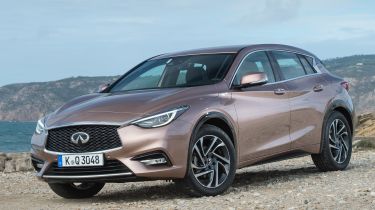Infiniti Q30 review - Engines, performance and drive
Engine range isn't the quickest, but diesels are refined. 2.0 litre Sport is outclassed by rivals

The Infiniti Q30 isn’t particularly fun to drive, with a lacklustre engine range and uninspiring handling. The 1.5-litre turbodiesel is expected to be the most popular as it is the most efficient, but performance is adequate rather than sensational.
The Q30’s redeeming feature when it comes to the driving experience is its smooth ride. In fact, it's one of the most comfortable cars in its class, making effortless progress on longer motorway journeys. If you’re going to be doing a lot of miles, they’ll fly by in this car.
There's one proviso to this. The lower and stiffer suspension of Sport spec takes away some of this ride comfort, but doesn't offer much more in the way of agility or fun. The bigger brakes means it stops with confidence, but there's not much wrong with the standard set-up. Premium spec is a better choice.
City driving isn’t as easy as rivals thanks to less-than-perfect visibility, especially over the shoulder. It doesn’t make a meal of winding roads, but the class standards in driver enjoyment set by the Audi A3 and BMW 1 Series are a tough act to follow.
The manual gearbox is a little bit disappointing. The Q30 is claiming to be a premium car but its self-shifter doesn’t offer a sophisticated experience. The automatic DCT gearbox is smoother, but commands a hefty premium.
Engines
The most popular engine for the Q30 is the 1.5-litre turbodiesel. Although it might seem like a dull choice, for most buyers it will offer a decent blend of performance and running costs.
It has 108bhp, 260Nm of torque and will hit 0-62mph in 12 seconds, so you'll be revving it through the gears to make progress. It feels reasonably swift in the mid-range, however.
The 1.5 isn't the quietest unit, but more powerful engines (like the punchy 2.2-litre diesel) are available with noise cancelling technology in the speakers to cut out some of the clatter.
The 120bhp 1.6-litre turbo petrol is quiet at idle and on the move, but requires more revving than the diesel and efficiency takes a hit. The 154bhp DCT automatic model is worth avoiding on this engine, though, as it makes the hatchback feel decidedly lethargic despite being more powerful.
The one we'd avoid is the 2.0-litre petrol. It's not an unpleasant engine by any means (it's borrowed from the Mercedes GLA 250) with plenty of mid-range thrust and decent refinement. But it just isn't anywhere near as fast as hatchback rivals with a similar £32k price tag. 0-62mph takes 7.2 seconds - Vauxhall will sell you a 1.6-litre Astra that is faster than that.








